Forms¶
The forms module provide several pre-build forms as well as a framework from which you can build your own forms.
All classes documented in this section can be imported as such:
>>> from rpw.ui.forms import Console
QuickForms¶
SelectFromList¶
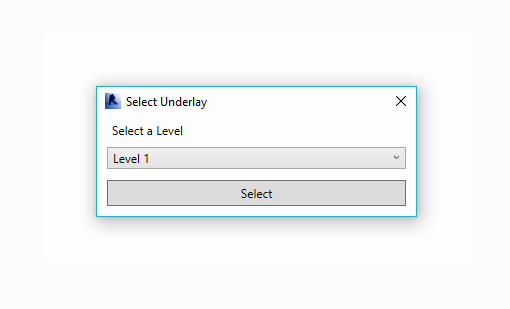
-
rpw.ui.forms.SelectFromList(title, options, description=None, sort=True, exit_on_close=True)¶ Simple FlexForm wrapped function with ComboBox and button
Parameters: - title (str) – Title of form
- options (dict,list[str]) – Dictionary (string keys) or List[strings]
- description (str) – Optional Description of input requested [default: None]
- sort (bool) – Optional sort flag - sorts keys [default: True]
- exit_on_close (bool) – Form will call sys.exit() if Closed on X. [default: True]
Usage:
>>> from rpw.ui.forms import SelectFromList >>> value = SelectFromList('Test Window', ['1','2','3']) >>> # Dropdown shows '1', '2' ,'3'. User clicks Select '1' >>> print(value) '1' >>> # Dictionary >>> value = SelectFromList('Test Window', {'Text':str, 'Number':int}) >>> # User clicks Text >>> print(value) str
TextInput¶
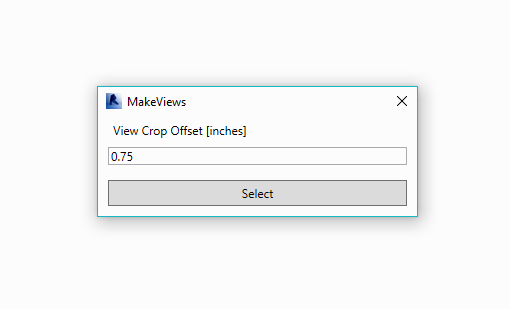
-
rpw.ui.forms.TextInput(title, default=None, description=None, sort=True, exit_on_close=True)¶ Simple FlexForm wrapped function with TextBox and button
Parameters: - title (str) – Title of form
- default (str) – Optional default value for text box [default: None]
- description (str) – Optional Description of input requested [default: None]
- exit_on_close (bool) – Form will call sys.exit() if Closed on X. [default: True]
Usage:
>>> from rpw.ui.forms import TextInput >>> value = TextInput('Title', default="3") >>> print(value) 3
TaskDialogs¶
TaskDialog¶
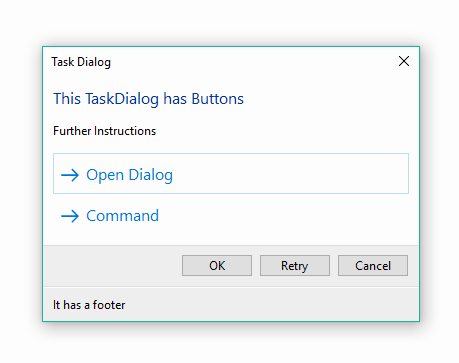
-
class
rpw.ui.forms.TaskDialog(instruction, commands=None, buttons=None, title='Task Dialog', content='', title_prefix=False, show_close=False, footer='', expanded_content='', verification_text='')¶ Task Dialog Wrapper
>>> from rpw.ui.forms import CommandLink, TaskDialog >>> commands= [CommandLink('Open Dialog', return_value='Open'), >>> ... CommandLink('Command', return_value=lambda: True)] >>> ... >>> dialog = TaskDialog('This TaskDialog has Buttons ', >>> ... title_prefix=False, >>> ... content="Further Instructions", >>> ... commands=commands, >>> ... buttons=['Cancel', 'OK', 'RETRY'], >>> ... footer='It has a footer', >>> ... # verification_text='Add Verification Checkbox', >>> ... # expanded_content='Add Expanded Content', >>> ... show_close=True) >>> dialog.show() 'Open'
- Wrapped Element:
- self._revit_object = Revit.UI.TaskDialog
Parameters: - content (str) – Main text of TaskDialog.
- commands (list, optional) – List of CommandLink Instances. Default is no buttons.
- buttons (list, optional) – List of TaskDialogCommonButtons names. Default is no buttons. ‘Close’ is shown if no commands are passed.
- title (str, optional) – Title of TaskDialog. Default is ‘Task Dialog’.p
- instruction (str, optional) – Main Instruction.
- footer (str, optional) – Footer Text. Default is
blank. - expanded_content (str, optional) – Expandable Text. Default is
blank. - verification_text (str, optional) – Checkbox text. Default is
blank. - title_prefix (bool, optional) – Prefix Title with app name.
Default is
False - show_close (bool, optional) – Show X to close. Default is False.
-
__init__(instruction, commands=None, buttons=None, title='Task Dialog', content='', title_prefix=False, show_close=False, footer='', expanded_content='', verification_text='')¶ Child classes can use self._revit_object to refer back to Revit Element
Warning
Any Wrapper that inherits and overrides __init__ class MUST ensure
_revit_objectis created by calling super().__init__ before setting any self attributes. Not doing so will cause recursion errors and Revit will crash. BaseObjectWrapper should define a class variable _revit_object_class to define the object class being wrapped.
-
show(exit=False)¶ Show TaskDialog
Parameters: exit (bool, optional) – Exit Script after Dialog. Useful for displaying Errors. Default is False. Returns: Returns is Falseif dialog is Cancelled (X or Cancel button). If CommandLink button is clicked,CommandLink.return_valueis returned - if one was not provided,CommandLink.textis used. If CommonButtons are clickedTaskDialog.TaskDialogResultname is returned ie(‘Close’, ‘Retry’, ‘Yes’, etc).
-
class
rpw.ui.forms.CommandLink(text, subtext='', return_value=None)¶ Command Link Helper Class
- Usage:
>>> from rpw.ui.forms import CommandLink, TaskDialog >>> CommandLink('Open Dialog', return_value=func_to_open) >>> TaskDialog('Title', commands=[CommandLink])
Parameters: - text (str) – Command Text
- subtext (str, optional) – Button Subtext
- return_value (any, optional) – Value returned if button is clicked. If none is provided, text is returned.
-
__init__(text, subtext='', return_value=None)¶ x.__init__(…) initializes x; see help(type(x)) for signature
Alert¶

-
class
rpw.ui.forms.Alert(content, title='Alert', header='', exit=False)¶ A Simple Revit TaskDialog for displaying quick messages
- Usage:
>>> from rpw.ui.forms import Alert >>> Alert('Your Message', title="Title", header="Header Text") >>> Alert('You need to select Something', exit=True)
Parameters: - message (str) – TaskDialog Content
- title (str, optional) – TaskDialog Title
- header (str, optional) – TaskDialog content header
- exit (bool, optional) – Exit Script after Dialog. Useful for displayin Errors. Default is False
OS Dialogs¶
Select Folder¶
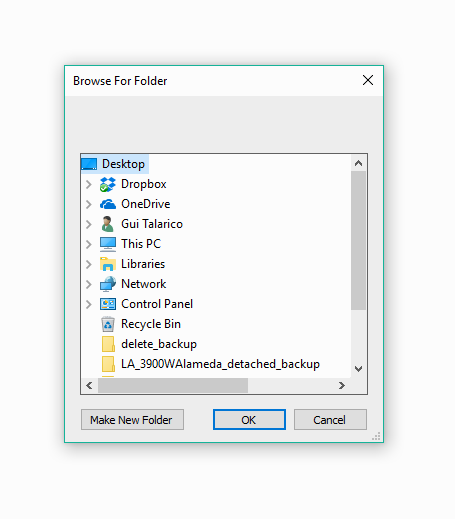
-
rpw.ui.forms.select_folder()¶ Selects a Folder Path using the standard OS Dialog. Uses Forms.FolderBrowserDialog(). For more information see: https://msdn.microsoft.com/en-us/library/system.windows.forms.openfiledialog.
>>> from rpw.ui.forms import select_folder >>> folderpath = select_folder() 'C:\folder\path'
Select File¶
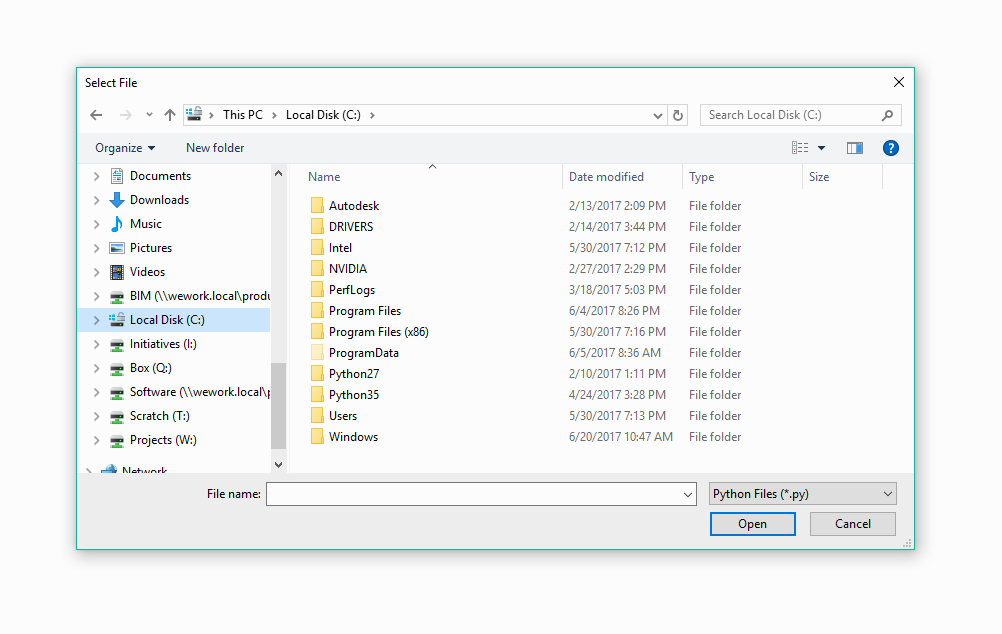
-
rpw.ui.forms.select_file(extensions='All Files (*.*)|*.*', title='Select File', multiple=False, restore_directory=True)¶ Selects a File Path using the standard OS Dialog. Uses Forms.OpenFileDialog https://msdn.microsoft.com/en-us/library/system.windows.forms.filedialog.filter
>>> from rpw.ui.forms import select_file >>> filepath = select_file('Revit Model (*.rvt)|*.rvt') 'C:\folder\file.rvt'
Parameters: - extensions (str, optional) – File Extensions Filtering options. Default is All Files (.)|*.*
- title (str, optional) – File Extensions Filtering options
- multiple (bool) – Allow selection of multiple files. Default is False
- restore_directory (bool) – Restores the directory to the previously selected directory before closing
Returns: filepath string if
multiple=Falseotherwise list of filepath stringsReturn type: filepath (list, string)
Console¶

REPL Console for Inspecting Stack
>>> from rpw.ui.forms import Console
>>> Console()
# Console is launched with locally defined variables injected into context.
- Keyboard Shortcuts:
UPIterate history upDownIterate history downTabIterate possible autocomplete options (works for dotted lookup)
Note
The last stack frame is automatically injected is the context of the evaluation loop of the console: the local and global variables from where the Console was called from should be available.
Inspection of the stack requires stack frames to be enabled.
If an exception is raised stating `object has no attribute '_getframe'
it means IronPython stack frames is not enabled.
You can enable it by running with the -X argument:
ipy.exe -X: FullFrames file.py.
If you are trying to use it from within Dynamo, stack inspection is currently not available due to how the engine is setup, but you can still use it by manually passing the context you want to inspect:
>>> Console(context=locals()) # or
>>> Console(context=globals())
-
class
rpw.ui.forms.Console(stack_level=1, stack_info=True, context=None, msg='')¶ -
__init__(stack_level=1, stack_info=True, context=None, msg='')¶ Parameters: - stack_level (int) – Default is 1. 0 Is the Console stack, 1 is the caller; 2 is previous to that, etc.
- stack_info – Display info about where call came from. Will print filename name, line no. and Caller name.
-
FlexForm¶
-
class
rpw.ui.forms.FlexForm(title, components, **kwargs)¶ Flex Form Usage
>>> from rpw.ui.forms import (FlexForm, Label, ComboBox, TextBox, TextBox, ... Separator, Button, CheckBox) >>> components = [Label('Pick Style:'), ... ComboBox('combobox1', {'Opt 1': 10.0, 'Opt 2': 20.0}), ... Label('Enter Name:'), ... TextBox('textbox1', Text="Default Value"), ... CheckBox('checkbox1', 'Check this'), ... Separator(), ... Button('Select')] >>> form = FlexForm('Title', components) >>> form.show() >>> # User selects `Opt 1`, types 'Wood' in TextBox, and select Checkbox >>> form.values {'combobox1': 10.0, 'textbox1': 'Wood', 'checkbox': True}
-
__init__(title, components, **kwargs)¶ Parameters: - title (
str) – Form Title - components (
list) – List of Form Components. - top_offset (
float) – Optional top offset. - options (
kwargs) – WPF Parameters Options
-
values¶ Dictionary of selected values
Type: dict
- title (
-
close()¶ Exits Form. Returns
Truetoshow()method
-
static
get_values(sender, e)¶ Default Get Values. Set form.values attribute with values from controls and closes form.
-
show()¶ Initializes Form. Returns
TrueorFalseif form was exited.
-
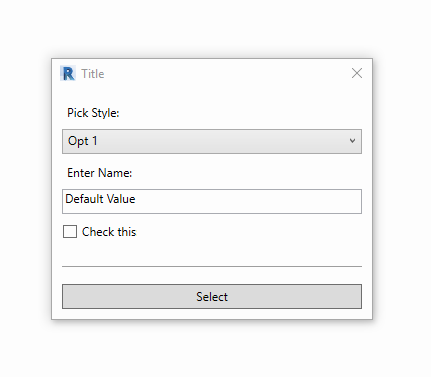
FlexForm Controls¶
-
class
rpw.ui.forms.Label(label_text, **kwargs)¶ Windows.Controls.Label Wrapper
>>> Label('Label Text')
-
__init__(label_text, **kwargs)¶ Parameters: - label_text (
str) – Label Text - wpf_params (kwargs) – Additional WPF attributes
- label_text (
-
-
class
rpw.ui.forms.TextBox(name, default='', **kwargs)¶ Windows.Controls.TextBox Wrapper
>>> TextBox()
-
__init__(name, default='', **kwargs)¶ Parameters: - name (
str) – Name of control. Will be used to return value - default (
bool) – SetsTextattribute of textbox [Default: ‘’] - wpf_params (kwargs) – Additional WPF attributes
- name (
-
-
class
rpw.ui.forms.CheckBox(name, checkbox_text, default=False, **kwargs)¶ Windows.Controls.Checkbox Wrapper
>>> CheckBox('Label')
-
__init__(name, checkbox_text, default=False, **kwargs)¶ Parameters: - name (
str) – Name of control. Will be used to return value - checkbox_text (
str) – Checkbox label Text - default (
bool) – Sets IsChecked state [Default: False] - wpf_params (kwargs) – Additional WPF attributes
- name (
-
-
class
rpw.ui.forms.ComboBox(name, options, default=None, sort=True, **kwargs)¶ Windows.Controls.ComboBox Wrapper
>>> ComboBox({'Option 1': Element, 'Option 2', 'Elemnet'}) >>> ComboBox({'Option 1': Element, 'Option 2', 'Elemnet'}, sort=False)
-
__init__(name, options, default=None, sort=True, **kwargs)¶ Parameters: - name (
str) – Name of control. Will be used to return value - options (
list,dict) – Ifdict, selected value is returned - default (
str) – Sets SelectedItem attribute [Default: first] - wpf_params (kwargs) – Additional WPF attributes
- name (
-
-
class
rpw.ui.forms.Button(button_text, on_click=None, **kwargs)¶ Windows.Controls.Button Wrapper
>>> Button('Select')
-
__init__(button_text, on_click=None, **kwargs)¶ Parameters: - button_text (
str) – Button Text - on_click (
func) – Registers Click event Function [Default:FlexForm.get_values] - wpf_params (kwargs) – Additional WPF attributes
- button_text (
-
-
class
rpw.ui.forms.Separator(**kwargs)¶ WPF Separator
Implementations¶
FlexForm
from itertools import count
from rpw.utils.dotnet import Enum
from rpw.ui.forms.resources import *
class FlexForm(Window):
"""
Flex Form Usage
>>> from rpw.ui.forms import (FlexForm, Label, ComboBox, TextBox, TextBox,
... Separator, Button, CheckBox)
>>> components = [Label('Pick Style:'),
... ComboBox('combobox1', {'Opt 1': 10.0, 'Opt 2': 20.0}),
... Label('Enter Name:'),
... TextBox('textbox1', Text="Default Value"),
... CheckBox('checkbox1', 'Check this'),
... Separator(),
... Button('Select')]
>>> form = FlexForm('Title', components)
>>> form.show()
>>> # User selects `Opt 1`, types 'Wood' in TextBox, and select Checkbox
>>> form.values
{'combobox1': 10.0, 'textbox1': 'Wood', 'checkbox': True}
"""
layout = """
<Window
xmlns="http://schemas.microsoft.com/winfx/2006/xaml/presentation"
xmlns:x="http://schemas.microsoft.com/winfx/2006/xaml"
xmlns:d="http://schemas.microsoft.com/expression/blend/2008"
xmlns:mc="http://schemas.openxmlformats.org/markup-compatibility/2006"
xmlns:local="clr-namespace:WpfApplication1" mc:Ignorable="d"
ResizeMode="NoResize"
WindowStartupLocation="CenterScreen"
Topmost="True"
SizeToContent="WidthAndHeight">
<Grid Name="MainGrid" Margin="10,10,10,10">
</Grid>
</Window>
"""
def __init__(self, title, components, **kwargs):
"""
Args:
title (``str``): Form Title
components (``list``): List of Form Components.
top_offset (``float``): Optional top offset.
options (``kwargs``): WPF Parameters Options
Attributes:
values (``dict``): Dictionary of selected values
"""
self.ui = wpf.LoadComponent(self, StringReader(self.layout))
self.ui.Title = title
self.values = {}
for key, value in kwargs.iteritems():
setattr(self, key, value)
for n, component in enumerate(components):
self.MainGrid.Children.Add(component)
if hasattr(component, 'on_click'):
component.Click += component.on_click
V_SPACE = 5
if n > 0:
prev_comp = components[n - 1]
top = prev_comp.Margin.Top + prev_comp.Height + V_SPACE
top += getattr(component, 'top_offset', 0)
component.Margin = Thickness(0, top, 0, 0)
def show(self):
"""
Initializes Form. Returns ``True`` or ``False`` if form was exited.
"""
return self.ShowDialog()
@staticmethod
def get_values(sender, e):
"""
Default Get Values. Set form.values attribute with values from controls
and closes form.
"""
component_values = {}
window = Window.GetWindow(sender)
for component in window.MainGrid.Children:
try:
component_values[component.Name] = component.value
except AttributeError:
pass
window.values = component_values
window.close()
def close(self):
""" Exits Form. Returns ``True`` to ``show()`` method """
self.DialogResult = True
self.Close()
class RpwControlMixin():
""" Control Mixin """
_index = count(0)
def __init__(self, **kwargs):
self.set_attrs(**kwargs)
def set_attrs(self, **kwargs):
""" Parses kwargs, sets default values where appropriate. """
self.index = next(self._index) # Counts Instatiation to control Height
# Default Values
control_type = self.__class__.__name__
if not self.Name:
self.Name = kwargs.get('Name', '{}_{}'.format(control_type, self.index))
self.Width = kwargs.get('Width', 300)
self.Height = kwargs.get('Height', 25)
h_align = Enum.Parse(HorizontalAlignment, kwargs.get('h_align', 'Left'))
self.HorizontalAlignment = h_align
v_align = Enum.Parse(VerticalAlignment, kwargs.get('v_align', 'Top'))
self.VerticalAlignment = v_align
# Inject Any other Custom Values into Component
# Updating __dict__ fails due to how .NET inheritance/properties works
for key, value in kwargs.iteritems():
setattr(self, key, value)
class Label(RpwControlMixin, Controls.Label):
"""
Windows.Controls.Label Wrapper
>>> Label('Label Text')
"""
def __init__(self, label_text, **kwargs):
"""
Args:
label_text (``str``): Label Text
wpf_params (kwargs): Additional WPF attributes
"""
self.Content = label_text
self.set_attrs(**kwargs)
class TextBox(RpwControlMixin, Controls.TextBox):
"""
Windows.Controls.TextBox Wrapper
>>> TextBox()
"""
def __init__(self, name, default='', **kwargs):
"""
Args:
name (``str``): Name of control. Will be used to return value
default (``bool``): Sets ``Text`` attribute of textbox [Default: '']
wpf_params (kwargs): Additional WPF attributes
"""
self.Name = name
self.Text = default
self.set_attrs(**kwargs)
if 'Height' not in kwargs:
self.Height = 25
@property
def value(self):
return self.Text
class Button(RpwControlMixin, Controls.Button):
"""
Windows.Controls.Button Wrapper
>>> Button('Select')
"""
def __init__(self, button_text, on_click=None, **kwargs):
"""
Args:
button_text (``str``): Button Text
on_click (``func``): Registers Click event Function [Default: :any:`FlexForm.get_values`]
wpf_params (kwargs): Additional WPF attributes
"""
self.Content = button_text
self.on_click = on_click or FlexForm.get_values
self.set_attrs(**kwargs)
class CheckBox(RpwControlMixin, Controls.CheckBox):
"""
Windows.Controls.Checkbox Wrapper
>>> CheckBox('Label')
"""
def __init__(self, name, checkbox_text, default=False, **kwargs):
"""
Args:
name (``str``): Name of control. Will be used to return value
checkbox_text (``str``): Checkbox label Text
default (``bool``): Sets IsChecked state [Default: False]
wpf_params (kwargs): Additional WPF attributes
"""
self.Name = name
self.Content = checkbox_text
self.IsChecked = default
self.set_attrs(top_offset=5, **kwargs)
@property
def value(self):
return self.IsChecked
class ComboBox(RpwControlMixin, Controls.ComboBox):
"""
Windows.Controls.ComboBox Wrapper
>>> ComboBox({'Option 1': Element, 'Option 2', 'Elemnet'})
>>> ComboBox({'Option 1': Element, 'Option 2', 'Elemnet'}, sort=False)
"""
def __init__(self, name, options, default=None, sort=True, **kwargs):
"""
Args:
name (``str``): Name of control. Will be used to return value
options (``list``, ``dict``): If ``dict``, selected value is returned
default (``str``): Sets SelectedItem attribute [Default: first]
wpf_params (kwargs): Additional WPF attributes
"""
self.Name = name
self.set_attrs(**kwargs)
index = 0
self.options = options
if hasattr(options, 'keys'):
options = options.keys()
if sort:
options.sort()
if default is None:
index = 0
else:
index = options.index(default)
self.Items.Clear()
self.ItemsSource = options
self.SelectedItem = options[index]
@property
def value(self):
selected = self.SelectedItem
if isinstance(self.options, dict):
selected = self.options[selected]
return selected
class Separator(RpwControlMixin, Controls.Separator):
""" WPF Separator """
if __name__ == '__main__':
""" TESTS """
components = [
Label('Pick Style:'),
ComboBox('combobox1', {'Opt 1': 10.0, 'Opt 2': 20.0}),
Label('Enter Name:'),
TextBox('textbox1', Text="Default Value"),
CheckBox('checkbox1', 'Check this:'),
Separator(),
Button('Select')]
form = FlexForm('Title', components)
form.show()
print(form.values)
QuickForm
import sys
from rpw.ui.forms.flexform import FlexForm, Label, ComboBox, TextBox, Button
def SelectFromList(title, options, description=None, sort=True, exit_on_close=True):
""" Simple FlexForm wrapped function with ComboBox and button
Args:
title (str): Title of form
options (dict,list[str]): Dictionary (string keys) or List[strings]
description (str): Optional Description of input requested [default: None]
sort (bool): Optional sort flag - sorts keys [default: True]
exit_on_close (bool): Form will call sys.exit() if Closed on X. [default: True]
Usage:
>>> from rpw.ui.forms import SelectFromList
>>> value = SelectFromList('Test Window', ['1','2','3'])
>>> # Dropdown shows '1', '2' ,'3'. User clicks Select '1'
>>> print(value)
'1'
>>> # Dictionary
>>> value = SelectFromList('Test Window', {'Text':str, 'Number':int})
>>> # User clicks Text
>>> print(value)
str
"""
components = []
if description:
components.append(Label(description))
components.append(ComboBox('combobox', options, sort=sort))
components.append(Button('Select'))
form = FlexForm(title, components)
ok = form.show()
if ok:
return form.values['combobox']
if exit_on_close:
sys.exit()
def TextInput(title, default=None, description=None, sort=True, exit_on_close=True):
""" Simple FlexForm wrapped function with TextBox and button
Args:
title (str): Title of form
default (str): Optional default value for text box [default: None]
description (str): Optional Description of input requested [default: None]
exit_on_close (bool): Form will call sys.exit() if Closed on X. [default: True]
Usage:
>>> from rpw.ui.forms import TextInput
>>> value = TextInput('Title', default="3")
>>> print(value)
3
"""
components = []
if description:
components.append(Label(description))
if default:
textbox = TextBox('textbox', default=default)
else:
textbox = TextBox('textbox')
components.append(textbox)
components.append(Button('Select'))
form = FlexForm(title, components)
ok = form.show()
if ok:
return form.values['textbox']
if exit_on_close:
sys.exit()
if __name__ == '__main__':
rv = SelectFromList('Title', ['A','B'], description="Your Options",
exit_on_close=True)
print(rv)
rv = SelectFromList('Title', {'A':5, 'B':10}, description="Your Options",
exit_on_close=True)
print(rv)
rv = TextInput('Title', default="3", exit_on_close=True)
print(rv)
print('forms.py ran')
TaskDialog
import sys
from rpw import UI
from rpw.exceptions import RpwValueError
from rpw.base import BaseObjectWrapper, BaseObject
class Alert():
"""
A Simple Revit TaskDialog for displaying quick messages
Usage:
>>> from rpw.ui.forms import Alert
>>> Alert('Your Message', title="Title", header="Header Text")
>>> Alert('You need to select Something', exit=True)
Args:
message (str): TaskDialog Content
title (str, optional): TaskDialog Title
header (str, optional): TaskDialog content header
exit (bool, optional): Exit Script after Dialog.
Useful for displayin Errors. Default is False
"""
def __init__(self, content, title='Alert', header='', exit=False):
dialog = UI.TaskDialog(title)
dialog.TitleAutoPrefix = False
dialog.MainInstruction = header
dialog.MainContent = content
self.result = dialog.Show()
if exit:
sys.exit(1)
class CommandLink(BaseObject):
"""
Command Link Helper Class
Usage:
>>> from rpw.ui.forms import CommandLink, TaskDialog
>>> CommandLink('Open Dialog', return_value=func_to_open)
>>> TaskDialog('Title', commands=[CommandLink])
Args:
text (str): Command Text
subtext (str, optional): Button Subtext
return_value (any, optional): Value returned if button is clicked.
If none is provided, text is returned.
"""
def __init__(self, text, subtext='', return_value=None):
self._id = None # This will later be set to TaskDialogCommandLinkId(n)
self.text = text
self.subtext = subtext
self.return_value = return_value if return_value is not None else text
def __repr__(self):
return super(CommandLink, self).__repr__(data={'id': self._id,
'text':self.text})
class TaskDialog(BaseObjectWrapper):
"""
Task Dialog Wrapper
>>> from rpw.ui.forms import CommandLink, TaskDialog
>>> commands= [CommandLink('Open Dialog', return_value='Open'),
>>> ... CommandLink('Command', return_value=lambda: True)]
>>> ...
>>> dialog = TaskDialog('This TaskDialog has Buttons ',
>>> ... title_prefix=False,
>>> ... content="Further Instructions",
>>> ... commands=commands,
>>> ... buttons=['Cancel', 'OK', 'RETRY'],
>>> ... footer='It has a footer',
>>> ... # verification_text='Add Verification Checkbox',
>>> ... # expanded_content='Add Expanded Content',
>>> ... show_close=True)
>>> dialog.show()
'Open'
Wrapped Element:
self._revit_object = `Revit.UI.TaskDialog`
Args:
content (str): Main text of TaskDialog.
commands (list, optional): List of CommandLink Instances.
Default is no buttons.
buttons (list, optional): List of TaskDialogCommonButtons names.
Default is no buttons. 'Close' is shown if no commands are passed.
title (str, optional): Title of TaskDialog. Default is 'Task Dialog'.p
instruction (str, optional): Main Instruction.
footer (str, optional): Footer Text. Default is ``blank``.
expanded_content (str, optional): Expandable Text. Default is ``blank``.
verification_text (str, optional): Checkbox text. Default is ``blank``.
title_prefix (bool, optional): Prefix Title with app name.
Default is ``False``
show_close (bool, optional): Show X to close. Default is False.
"""
_revit_object_class = UI.TaskDialog
_common_buttons = ['Ok', 'Yes', 'No', 'Cancel', 'Retry', 'Close']
def __init__(self, instruction, commands=None, buttons=None,
title='Task Dialog', content='',
title_prefix=False, show_close=False,
footer='', expanded_content='', verification_text=''
):
super(TaskDialog, self).__init__(UI.TaskDialog(title))
self.dialog = self._revit_object
# Settings
self.dialog.TitleAutoPrefix = title_prefix
self.dialog.AllowCancellation = show_close
# Properties
self.dialog.Title = title
self.dialog.MainInstruction = instruction
self.dialog.MainContent = content
self.dialog.FooterText = footer
self.dialog.ExpandedContent = expanded_content
self.dialog.VerificationText = verification_text
self.verification_checked = None if not verification_text else False
# Add Buttons
self.buttons = buttons or []
common_buttons_names = []
for button_name in [b.capitalize() for b in self.buttons]:
if button_name not in self._common_buttons:
raise RpwValueError('TaskDialogCommonButtons member', button_name)
button_full_name = 'UI.TaskDialogCommonButtons.' + button_name
common_buttons_names.append(button_full_name)
if common_buttons_names:
common_buttons = eval('|'.join(common_buttons_names))
self.dialog.CommonButtons = common_buttons
# Set Default Button
self.dialog.DefaultButton = UI.TaskDialogResult.None
# Validate Commands
commands = commands or []
if len(commands) > 4:
raise RpwValueError('4 or less command links', len(commands))
# Process Commands
self.commands = {}
for link_index, command_link in enumerate(commands, 1):
command_id = 'CommandLink{}'.format(link_index)
command_link._id = getattr(UI.TaskDialogCommandLinkId, command_id)
self.commands[command_id] = command_link
self.dialog.AddCommandLink(command_link._id,
command_link.text,
command_link.subtext)
def show(self, exit=False):
"""
Show TaskDialog
Args:
exit (bool, optional): Exit Script after Dialog. Useful for
displaying Errors. Default is False.
Returns:
Returns is ``False`` if dialog is Cancelled (X or Cancel button).
If CommandLink button is clicked, ``CommandLink.return_value``
is returned - if one was not provided, ``CommandLink.text`` is used.
If CommonButtons are clicked ``TaskDialog.TaskDialogResult`` name is
returned ie('Close', 'Retry', 'Yes', etc).
"""
self.result = self.dialog.Show()
try:
self.verification_checked = self.dialog.WasVerificationChecked()
except:
self.verification_checked = None
# Handle Cancel
if self.result == UI.TaskDialogResult.Cancel:
if exit:
sys.exit(1)
return None
# If result is a CommandLink, return Return Value else Result
command_link = self.commands.get(str(self.result))
if command_link:
return command_link.return_value
else:
return self.result.ToString()
if __name__ == '__main__':
Alert('Test Alert!')
def sample_callback():
print('Calling B')
d = UI.TaskDialog("Revit Build Information")
d.MainInstruction = "Button 1"
d.Show()
from rpw.ui.forms.taskdialog import *
commands = [
CommandLink('TestTitle', return_value=sample_callback, subtext='test subtext'),
CommandLink('TestTitle2', return_value=lambda: 'Empty', subtext='test subtext2')
]
t = TaskDialog(commands=commands, buttons=['Yes'])
OS Dialogs
from rpw.ui.forms.resources import *
def select_folder():
"""
Selects a Folder Path using the standard OS Dialog.
Uses Forms.FolderBrowserDialog(). For more information see:
https://msdn.microsoft.com/en-us/library/system.windows.forms.openfiledialog.
>>> from rpw.ui.forms import select_folder
>>> folderpath = select_folder()
'C:\\folder\\path'
"""
form = Forms.FolderBrowserDialog()
if form.ShowDialog() == Forms.DialogResult.OK:
return form.SelectedPath
def select_file(extensions='All Files (*.*)|*.*',
title="Select File",
multiple=False,
restore_directory=True):
"""
Selects a File Path using the standard OS Dialog.
Uses Forms.OpenFileDialog
https://msdn.microsoft.com/en-us/library/system.windows.forms.filedialog.filter
>>> from rpw.ui.forms import select_file
>>> filepath = select_file('Revit Model (*.rvt)|*.rvt')
'C:\\folder\\file.rvt'
Args:
extensions (str, optional): File Extensions Filtering options. Default is All Files (*.*)|*.*
title (str, optional): File Extensions Filtering options
multiple (bool): Allow selection of multiple files. Default is `False`
restore_directory (bool): Restores the directory to the previously selected directory before closing
Returns:
filepath (list, string): filepath string if ``multiple=False`` otherwise list of filepath strings
"""
form = Forms.OpenFileDialog()
form.Filter = extensions
form.Title = title
form.Multiselect = multiple
form.RestoreDirectory = restore_directory
if form.ShowDialog() == Forms.DialogResult.OK:
return form.FileName if not multiple else list(form.FileNames)
# Tests
if __name__ == '__main__':
# print(select_folder())
# print(select_file('Python Files|*.py'))
print(select_file('Python Files|*.py', multiple=False))
print(select_file('Python Files|*.py', multiple=True))
Console
import os
import inspect
import logging
import tempfile
from collections import defaultdict
import traceback
from rpw.utils.rlcompleter import Completer
from rpw.ui.forms.resources import Window
from rpw.ui.forms.resources import *
# logger.verbose(False)
class Console(Window):
LAYOUT = """
<Window xmlns="http://schemas.microsoft.com/winfx/2006/xaml/presentation"
xmlns:x="http://schemas.microsoft.com/winfx/2006/xaml"
Title="DeployWindow" Height="400" Width="800" SnapsToDevicePixels="True"
UseLayoutRounding="True" WindowState="Normal"
WindowStartupLocation="CenterScreen">
<Window.Resources>
<Style TargetType="{x:Type MenuItem}">
<Setter Property="FontFamily" Value="Consolas"/>
<Setter Property="FontSize" Value="12.0"/>
</Style>
</Window.Resources>
<Grid>
<Grid.ColumnDefinitions>
<ColumnDefinition Width="*"></ColumnDefinition>
</Grid.ColumnDefinitions>
<Grid.RowDefinitions>
<RowDefinition Height="0"></RowDefinition>
<RowDefinition Height="*"></RowDefinition>
</Grid.RowDefinitions>
<TextBox Grid.Column="1" Grid.Row="1" HorizontalAlignment="Stretch"
Name="tbox" Margin="6,6,6,6" VerticalAlignment="Stretch"
AcceptsReturn="True" VerticalScrollBarVisibility="Auto"
TextWrapping="Wrap"
FontFamily="Consolas" FontSize="12.0"
/>
</Grid>
</Window>
"""
# <Button Content="Terminate" Margin="6,6,6,6" Height="30"
# Grid.Column="1" Grid.Row="1" VerticalAlignment="Bottom"
# Click="terminate"></Button>
CARET = '>>> '
def __init__(self, stack_level=1, stack_info=True, context=None, msg=''):
"""
Args:
stack_level (int): Default is 1. 0 Is the Console stack, 1 is the
caller; 2 is previous to that, etc.
stack_info (bool): Display info about where call came from.
Will print filename name, line no. and Caller
name.
msg (str): Message to display on start.
Only available if using context
context (dict): Optional Dictionary for when inspection is not
possible.
"""
# History Helper
tempdir = tempfile.gettempdir()
filename = 'rpw-history'
self.history_file = os.path.join(tempdir, filename)
self.stack_locals = {}
self.stack_globals = {}
self.stack_level = stack_level
if context:
self.stack_locals.update(context)
# Allows to pass context manually, so it can be used in Dynamo
# Where inspection does not work
else:
# Stack Info
# stack_frame = inspect.currentframe().f_back
stack_frame = inspect.stack()[stack_level][0] # Finds Calling Stack
self.stack_locals.update(stack_frame.f_locals)
self.stack_globals.update(stack_frame.f_globals)
# Debug Console
self.stack_globals.update({'stack': inspect.stack()})
stack_code = stack_frame.f_code
stack_filename = os.path.basename(stack_code.co_filename)
stack_lineno = stack_code.co_firstlineno
stack_caller = stack_code.co_name
self._update_completer()
# Form Setup
self.ui = wpf.LoadComponent(self, StringReader(Console.LAYOUT))
self.ui.Title = 'RevitPythonWrapper Console'
self.PreviewKeyDown += self.KeyPressPreview
self.KeyUp += self.OnKeyUpHandler
self.is_loaded = False
# Form Init
self.ui.tbox.Focus()
if not context and stack_info:
self.write_line('Caller: {} [ Line:{}] | File: {}'.format(
stack_caller,
stack_lineno,
stack_filename))
elif msg:
self.write_line(msg)
else:
self.tbox.Text = Console.CARET
self.ui.tbox.CaretIndex = len(self.tbox.Text)
# Vars
self.history_index = 0
self.ac_options = defaultdict(int)
self.ShowDialog()
def force_quit(self, sender, e):
raise SystemExit('Force Quit')
def _update_completer(self):
# Updates Completer. Used at start, and after each exec loop
context = self.stack_locals.copy()
context.update(self.stack_globals)
# context.update(vars(__builtins__))
self.completer = Completer(context)
def get_line(self, index):
line = self.tbox.GetLineText(index).replace('\r\n', '')
if line.startswith(Console.CARET):
line = line[len(Console.CARET):]
logger.debug('Get Line: {}'.format(line))
return line
def get_last_line(self):
try:
last_line = self.get_lines()[-1]
except IndexError:
last_line = self.get_line(0)
logger.debug('Last Line: {}'.format(last_line))
return last_line
def get_last_entered_line(self):
try:
last_line = self.get_lines()[-2]
except IndexError:
last_line = self.get_line(0)
logger.debug('Last Line: {}'.format(last_line))
return last_line
def get_lines(self):
last_line_index = self.tbox.LineCount
lines = []
for index in range(0, last_line_index):
line = self.get_line(index)
lines.append(line)
logger.debug('Lines: {}'.format(lines))
return lines
def OnKeyUpHandler(self, sender, args):
# Need to use this to be able to override ENTER
if not self.is_loaded:
return
if args.Key == Key.Enter:
entered_line = self.get_last_entered_line()
if entered_line == '':
self.write_line(None)
return
output = self.evaluate(entered_line)
self.append_history(entered_line)
self.history_index = 0
self.write_line(output)
self.tbox.ScrollToEnd()
def format_exception(self):
""" Formats Last Exception"""
exc_type, exc_value, exc_traceback = sys.exc_info()
tb = traceback.format_exception(exc_type, exc_value, exc_traceback)
last_exception = tb[-1]
output = 'Traceback:\n' + last_exception[:-1]
return output
def evaluate(self, line):
try:
output = eval(line, self.stack_globals, self.stack_locals)
except SyntaxError as exc:
try:
exec(line, self.stack_globals, self.stack_locals)
self._update_completer() # Update completer with new locals
return
except Exception as exc:
output = self.format_exception()
except Exception as exc:
output = self.format_exception()
return str(output)
def OnKeyDownHandler(self, sender, args):
pass
@property
def last_caret_start_index(self):
return self.tbox.Text.rfind(Console.CARET)
@property
def last_caret_end_index(self):
return self.last_caret_start_index + len(Console.CARET)
@property
def last_caret_line_start_index(self):
return self.last_caret_start_index - len(Console.CARET)
def reset_caret(self):
self.tbox.CaretIndex = self.last_caret_end_index
def KeyPressPreview(self, sender, e):
# This Happens before all other key handlers
# If e.Handled = True, stops event propagation here.
e.Handled = False
if self.tbox.CaretIndex < self.last_caret_start_index:
self.tbox.CaretIndex = len(self.tbox.Text)
if e.Key == Key.Up:
self.history_up()
e.Handled = True
if e.Key == Key.Down:
self.history_down()
e.Handled = True
if e.Key == Key.Left or e.Key == Key.Back:
if self.ui.tbox.CaretIndex == self.last_caret_end_index:
e.Handled = True
if e.Key == Key.Home:
self.reset_caret()
e.Handled = True
if e.Key == Key.Tab:
self.autocomplete()
e.Handled = True
if e.Key == Key.Enter:
self.is_loaded = True
self.tbox.CaretIndex = len(self.tbox.Text)
def autocomplete(self):
text = self.tbox.Text[self.last_caret_end_index:self.tbox.CaretIndex]
logger.debug('Text: {}'.format(text))
# Create Dictionary to Track iteration over suggestion
index = self.ac_options[text]
suggestion = self.completer.complete(text, index)
logger.debug('ac_options: {}'.format(self.ac_options))
logger.debug('Sug: {}'.format(suggestion))
if not suggestion:
self.ac_options[text] = 0
else:
self.ac_options[text] += 1
if suggestion.endswith('('):
suggestion = suggestion[:-1]
if suggestion is not None:
caret_index = self.tbox.CaretIndex
self.write_text(suggestion)
self.tbox.CaretIndex = caret_index
def write(self, text):
""" Make Console usable as File Object """
self.write_line(line=text)
def write_line(self, line=None):
# Used for Code Output
# Writes line with no starting caret, new line + caret
if line:
self.tbox.AppendText(line)
self.tbox.AppendText(NewLine)
self.tbox.AppendText(Console.CARET)
def write_text(self, line):
# Used by Autocomplete and History
# Adds text to line, including Caret
self.tbox.Text = self.tbox.Text[0:self.last_caret_start_index]
self.tbox.AppendText(Console.CARET)
self.tbox.AppendText(line)
self.ui.tbox.CaretIndex = len(self.ui.tbox.Text)
def get_all_history(self):
# TODO: Add clean up when history > X
with open(self.history_file) as fp:
lines = fp.read().split('\n')
return [line for line in lines if line != '']
def history_up(self):
self.history_index += 1
line = self.history_iter()
if line is not None:
self.write_text(line)
def history_down(self):
self.history_index -= 1
line = self.history_iter()
if line is not None:
self.write_text(line)
def append_history(self, line):
logger.debug('Adding Line to History:' + repr(line))
with open(self.history_file, 'a') as fp:
fp.write(line + '\n')
def history_iter(self):
lines = self.get_all_history()
logger.debug('Lines: {}'.format(lines))
try:
line = lines[::-1][self.history_index - 1]
# Wrap around lines to loop and up down infinetly.
except IndexError:
if len(lines) == 0:
return None
if len(lines) < 0:
self.history_index += len(lines)
if len(lines) > 0:
self.history_index -= len(lines)
line = lines[0]
return line
def __repr__(self):
'<rpw:Console stack_level={}>'.format(self.stack_level)
if __name__ == '__main__':
def test():
x = 1
# Console()
Console(context=locals())
test()
z = 2
Resources
import sys
from abc import ABCMeta
from rpw import revit
from rpw.utils.dotnet import clr
from rpw.utils.logger import logger
# WPF/Form Imports
clr.AddReference("PresentationFramework") # System.Windows: Controls, ?
clr.AddReference("WindowsBase") # System.Windows.Input
clr.AddReference("System.Drawing") # FontFamily
clr.AddReference('System.Windows.Forms') # Forms
import System.Windows
from System.Windows import Window
from System.IO import StringReader
# Console
from System.Environment import Exit, NewLine
from System.Drawing import FontFamily
from System.Windows.Input import Key
# FlexForm Imports
from System.Windows import Controls, Window
from System.Windows import HorizontalAlignment, VerticalAlignment, Thickness
# OS Dialogs
from System.Windows import Forms
if revit.host == 'Dynamo':
# IronPython 2.7.3 - Dynamo + RPS w/out pyRevit
# Conflicts with PyRevit. Must Ensure exact path is specified
# https://github.com/architecture-building-systems/revitpythonshell/issues/46
clr.AddReferenceToFileAndPath(r'C:\Program Files (x86)\IronPython 2.7\Platforms\Net40\IronPython.Wpf.dll')
import wpf
# on 2.7.7 this raises wpf import error
else:
# IronPython 2.7.7 - pyRevit
# clr.AddReference('IronPython') # Works W/Out
clr.AddReference('IronPython.Wpf') # 2.7.
from IronPython.Modules import Wpf as wpf
# on 2.7.7 this works. On 2.7.3 you get a LoadComponent 3 args error